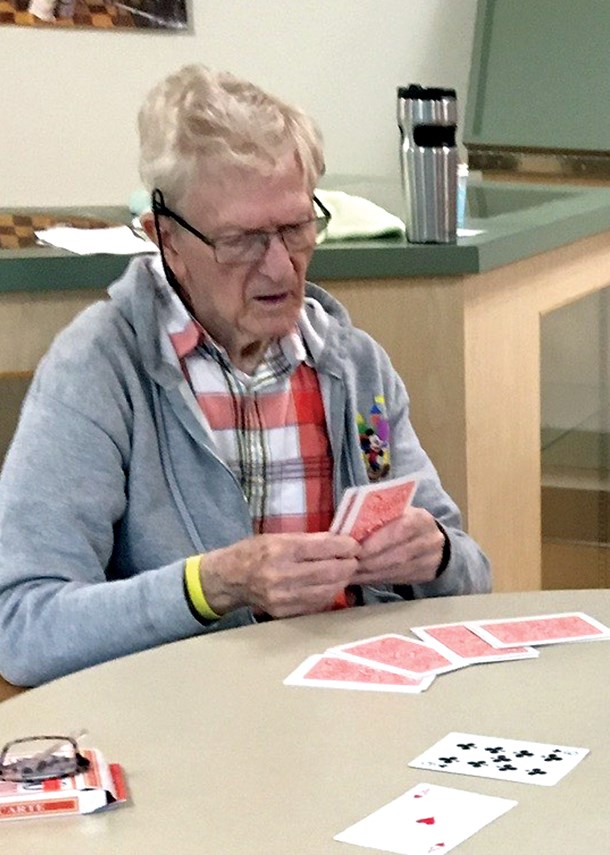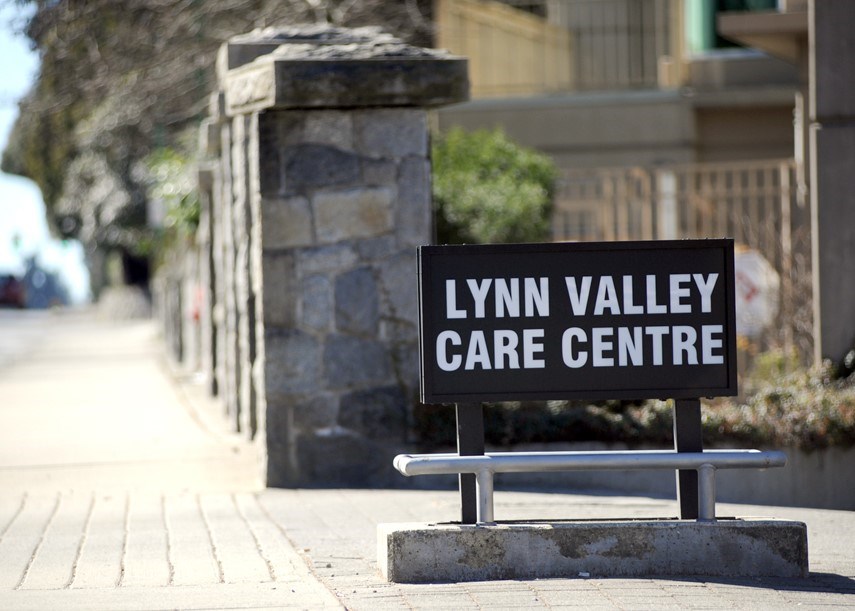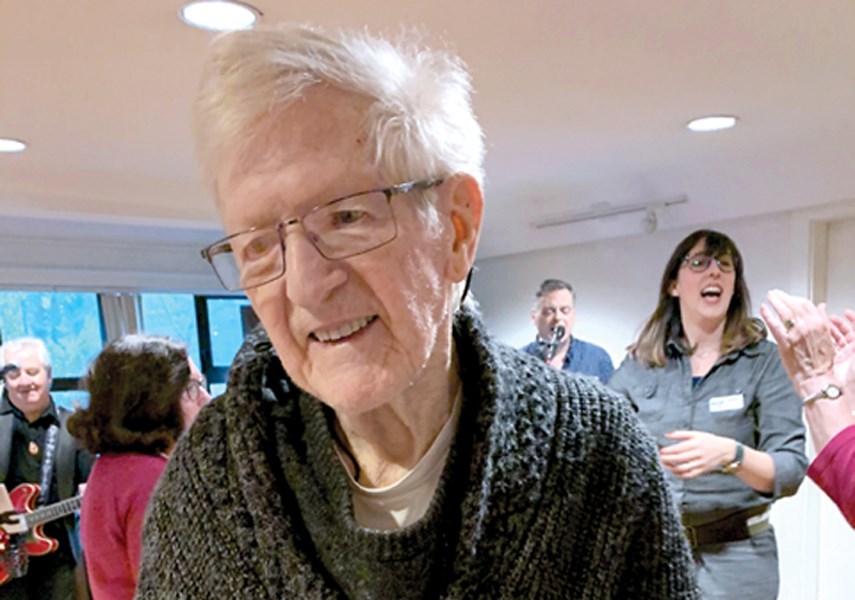Kelly Shellard’s father lives on the second floor of the lodge at North Vancouver’s Lynn Valley Care Centre that has been ground zero for British Columbia's coronavirus outbreak.
Bill Shellard, 81, has dementia, but he still loves a party and a whirl around the dance floor.
There hasn’t been any dancing lately.
It’s here, just a few blocks from Kelly Shellard’s Lynn Valley home, that in the province two weeks ago and where Canada’s first coronavirus death was recorded.
Since then, the virus has torn through the care home, where many frail and elderly patients have little resistance to offer.

A total of 36 residents of the home have now tested positive for the virus, Bill Shellard among them. Eight residents have died – all but one of the nine B.C. residents who have died of COVID-19 were living at Lynn Valley Care Centre, in the same lodge as Shellard’s dad.
What Kelly Shellard has seen has made her sad and afraid, both for her father and for the rest of us.
Despite heroic efforts of those workers who have continued to show up, many of them working double shifts, Shellard says she’s seen a system fragmented and overwhelmed, unable to provide the care it should for some of the most vulnerable.
In recent days, Shellard’s sister has been helping with essential care of their father.
“And what she can see from walking down the hall is almost every room has the red sign outside of it. And the red sign means number 1, you are in the process of getting tested for COVID, or number 2, you are coded positive,” said Shellard. ”There are now way more people with the signs outside of their rooms that are red than have no sign at all,” she said.
Residents are being confined to their rooms in an attempt to stop the spread of the virus, but there still aren’t enough care aides to take care of them all properly, said Shellard, especially when those workers now have to don protective gear every time they enter the room of a resident who has COVID-19.
“They need 10 times the amount of people that they have on now If they are going to care for the people who are in there,” she said.
“They need somebody giving them lots and lots of liquid. They need somebody in there just holding their hands.”

“We need to give people - some of whom are at the ends of their lives - more than the very, very basic care they are getting there now.”
Shellard knows what it is to be a caregiver. For four years before her dad went into long-term care, she looked after her dad.
That changed when he fell a couple of times and his health took a significant downturn. He started to wander. When a neighbour found him walking down the street at 3 a.m., “I realized I couldn’t care for my dad anymore.”
The Lynn Valley care home was ideal, and her dad thrived there, participating in every social and musical event on offer, said Shellard.
“Every single birthday party my dad was there,” she said.
He loved to dance. “He was Mr. Social, so when you’ve got a gentleman who can dance, you want him to go to the parties, because then he can dance with all the ladies.”
But her father’s life changed abruptly two weeks ago. Family members were asked to come to a meeting on March 7 where they were informed that cases of COVID-19 had been found in the care home.
Shellard went home and stewed on it. A few hours later she went back to the care centre.
“I ended up being one of the people who handed out dinner because people weren’t showing up for their shifts,” she said. “That was utter and complete panic and chaos.”
It was the same the next day. “I was there for hours,” she said. Some staff didn’t show up because they were sick themselves or had been in close contact with those who were. Others were afraid.
Those who have continued to provide care have been heroes, she said. “I cannot say enough about them. They are hard working. Many of them are doing double shifts. They are giving the absolute best care that they can.”
But it’s still a challenge.
“When three-quarters of the residents are now [COVID-19] positive or in the process of becoming positive ... how can the staffing levels that were in place before be appropriate for what's going in there now?” she said.
While families acknowledge more staff have been hired this week, those numbers are still not at the levels they were before the outbreak, said Shellard.
For her dad, whose dementia means he can’t fully understand what’s happened, the experience has been frustrating and anxiety-provoking, she said. He knows one of the men he regularly sat with for meals has died. He knows another of his friends has also tested positive.
Her dad is safe in his room when a family member is there with him. But when they aren’t, “he leaves his room,” she said. And there aren’t always enough staff to keep track of that.
One morning her sister found their dad wandering the halls, anxious, and looking for someone to help empty his urine bag.
They had no idea where he had wandered to and who he might have contacted.
Shellard said she’s beyond frustrated that Â鶹´«Ă˝Ół»Coastal Health has not been able to provide the care that residents need, despite the efforts of staff. “They’re not getting the people in there that need to be there,” she said.
Several sources told the North Shore News that Â鶹´«Ă˝Ół»Coastal Health has had to offer care aides – who work for a contractor – a significant boost in pay in order to get workers to continue going to the Lynn Valley care home. That’s partly because workers who provide care there can no longer work at other care homes – a common practice before the outbreak, and one of the factors that led to a resident and a worker testing positive at West Vancouver’s Hollyburn House as well.
In interviews with the North Shore News, families of other residents voiced concerns similar to Shellard’s.
One North Â鶹´«Ă˝Ół»daughter worried that a lack of cleaning staff early in the outbreak may have contributed to the spread of the virus.
Another son, who can’t visit his parent because of his own underlying health problems, said information provided to families has been sparse. “It’s at times really frustrating,” he said, while adding he knows resources are stretched. “I believe they’re at war in there.”
Knowing he can’t be there to comfort his family member is hard, he said, but “I have to balance my guilt with my future.”
Carrie Stefanson, spokeswoman for Â鶹´«Ă˝Ół»Coastal Health, which is leading the outbreak response at the care centre, said in an emailed statement that, “We recognize the increased concern families have about the care of their loved ones.”
The care centre is operating “very near target staffing,” according to the emailed statement and “we are working with the operator to add additional staff as needed.”
“We recognize the stepped up outbreak response precautions delayed the delivery of some services, including meals. We’re committed to providing residents the care they need....”
In a press conference on Wednesday, Dr. Bonnie Henry, chief medical health officer for the province, said the situation at the North Â鶹´«Ă˝Ół»care centre “is absolutely a concern to me.”
She repeated that message on Friday, adding that having 18 staff members also test positive has added to the challenge. “It’s a very stressful situation,” she said. “I know the staff at Lynn Valley care a great deal about the residents.”
In the midst of the crisis, Shellard said she’s deeply grateful to the care workers who have continued to show up to support her dad and other residents.
But she also worries. “I’ve been going in there for over a year now. I’ve got to know many people in there. I know many of their names,” she said. “I’ve spent a lot of time with them and I don’t want to see anybody die. I’ve already seen three people I know die.”
Other families in B.C. need to know what happened in North Vancouver, said Shellard. “I don’t want them to be in this position, but I fear they are going to be if they have their parents in care homes in British Columbia.”
“It’s beyond heartbreaking.”



